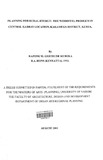| dc.description.abstract | Woodfuel is a predominant source of rural domestic energy in African, Asian and South
American countries, whereby the population depend heavily on wood to meet their
basic energy needs. This means that the management and / or conservation of wood fuel
resources should be considered a major issue in national development and planning
goals particularly energy planning and its policies.
This study set out to examine the woodfuel problem in rural areas, Central Kabras
Location in order to provide an understanding of the problem. The study established
that the woodfuel resources in Central Kabras Location are diminishing due to
increasing population and family sizes, deforestation, land use patterns, unchecked
wood energy conversion methods, social, cultural values, weak institutional framework
among others.
The declining trend of woodfuel resource is manifested in devotion of more time to
fuelwood gath~i!1:i .walking long distances in search of the resource, consumption of
agricultural/crop residues as substitutes to woodfuel, decline in soil fertility, change in
dietary patterns, minimization of fuel consumption and commercialization of the
woodfuel resource.
As the situation stands at present, woodfuel remains a major energy source and a
determining environmental and development issues therefore the study recommended
short- and long-term intervention and approaches or measures to increase energy
production. The short-term approaches include woodfuel conservation or management,
supply enhancement (through the practice of agroforestry and planting woodlots),
institutional development and community participation, and provision of extension
services. The long-term intervention approaches, are intended to diversify energy
sources (that is electricity, biogas and solar) that can be used by those who can afford in order to reduce over reliance on the woodfuel resources.
These interventions measures should be integrated in the national and I or regional
development and environmental planning processes to improve the woodfuel
production for the present and future generations. The mechanisms to achieve this
include enforcing planning laws and regulations, the Chiefs Act, and the National
Environmental Management and Co-ordination Act among others | en |

